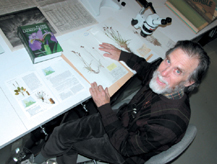Volume 10, Issue 02
May 2007
bulletin
français

| Subscription information If you would like to subscribe, have any questions or if would like to contribute a news item, please contact Yann Vergriete, newsletter editor or David Gailbraith, CBCN executive director: yannvergriete@fastmail.fm dgalbraith@rbg.ca |
| 8. The Canadian University Biodiversity Consortium and a new biodiversity center at the Montréal Botanical Garden, Anne Bruneau, Institut de recherche en biologie végétale, Université de Montréal
The Canadian University Biodiversity Consortium is a partnership headed by the Université de Montréal, in collaboration with the universities of British Columbia, Alberta, Saskatchewan, Manitoba, Toronto, Guelph, York, McGill, Laval, Acadia and Memorial, the Montreal Botanical Garden, University of British Columbia Botanical Garden, Devonian Botanical Garden, Harriet Irving Botanical Garden, Memorial University Botanical Garden and the Royal Ontario Museum. The Consortium was recently funded by the Canadian Foundation for Innovation programme to a total of 16 million dollars. This Consortium unites Canadian researchers from multiple disciplines, renowned for their expertise in a diversity of taxonomic groups, tools and approaches. The project focuses on three of the most diverse, and ecologically and economically important groups of organisms: plants, insects and fungi, the latter two representing some of the most poorly understood and inventoried organisms world-wide. The consortium has three principal objectives:
Long-term conservation will be ensured in temperature- and humidity-controlled museological conditions appropriate for the collections. Associated with well-known public institutions, which each year host millions of visitors, the value of these collections will be highlighted through dynamic scientific exhibitions illustrating the importance of collections and of biodiversity studies. The Consortium has an important role in public awareness of biodiversity, in instilling in youths a respect for the environment, and in promoting the natural wealth within Canada. By creating a network of excellence and expertise on plant, insect and fungal systematics and biodiversity, this Consortium represents an important national effort to face the challenge of decline in taxonomic expertise and the need for rapid identification and organisation of biodiversity data. The project will also speed up the discovery of the innumerable still-unknown species of the Canadian biota, and help establish and promote the best means for a sustainable use of this natural wealth. This Consortium will be important in inventorying, understanding and protecting biodiversity.
|


